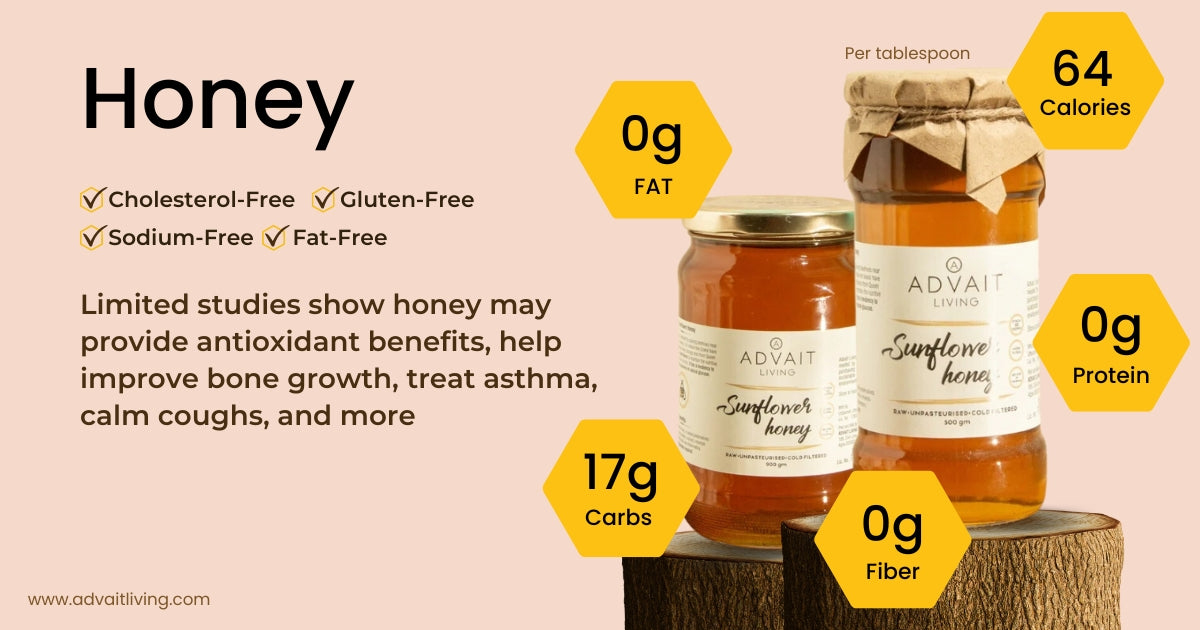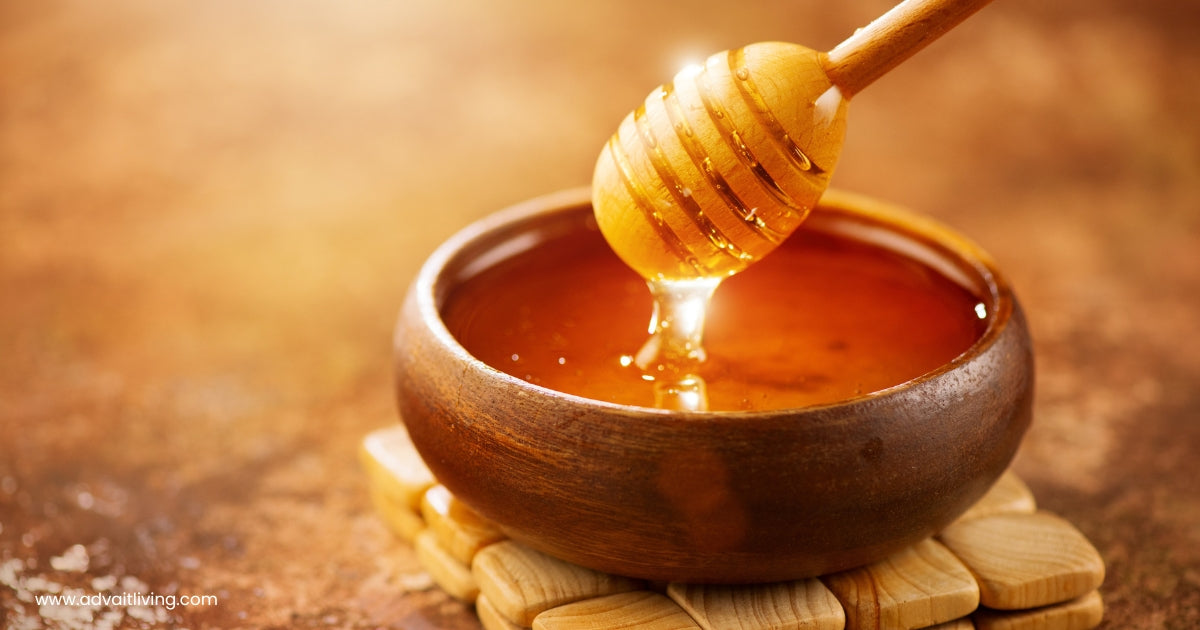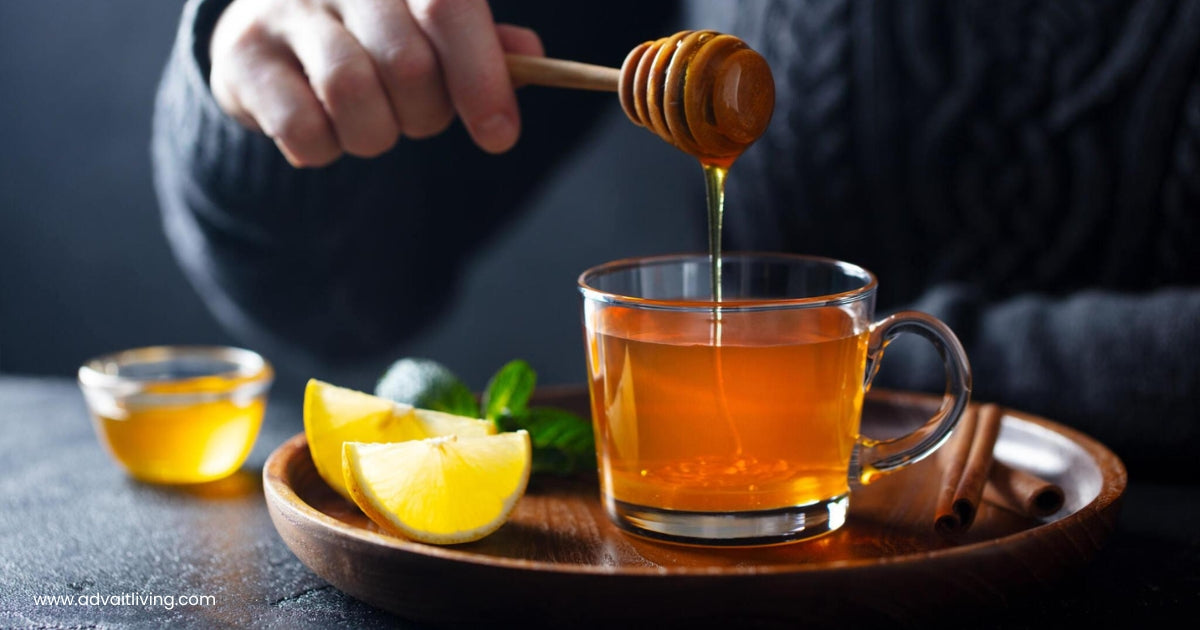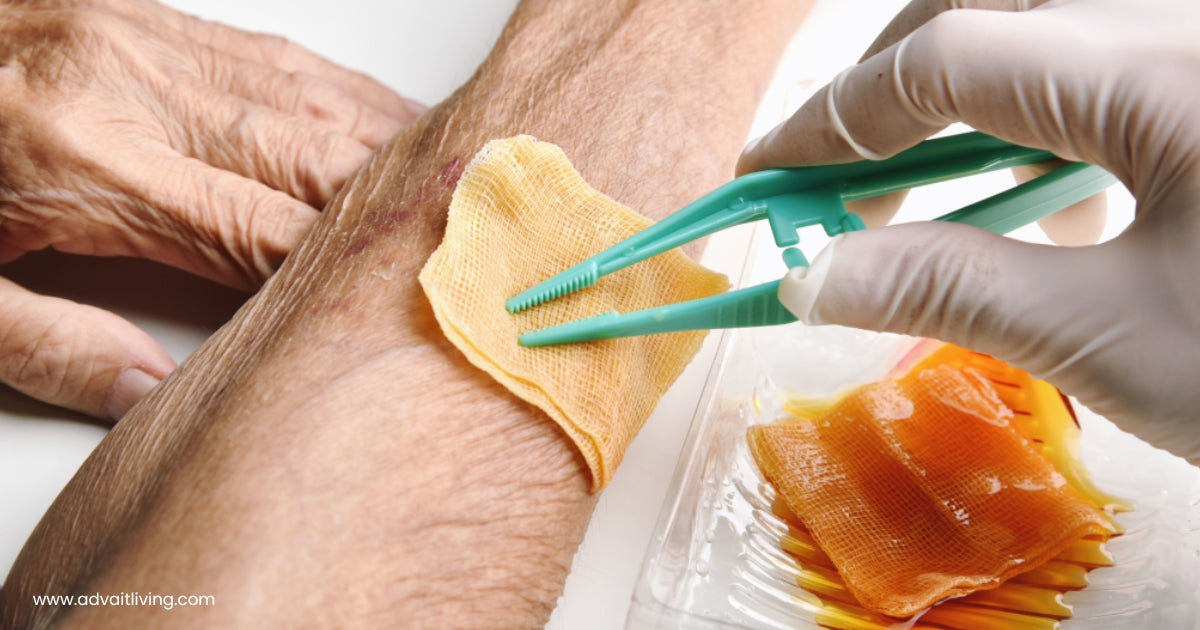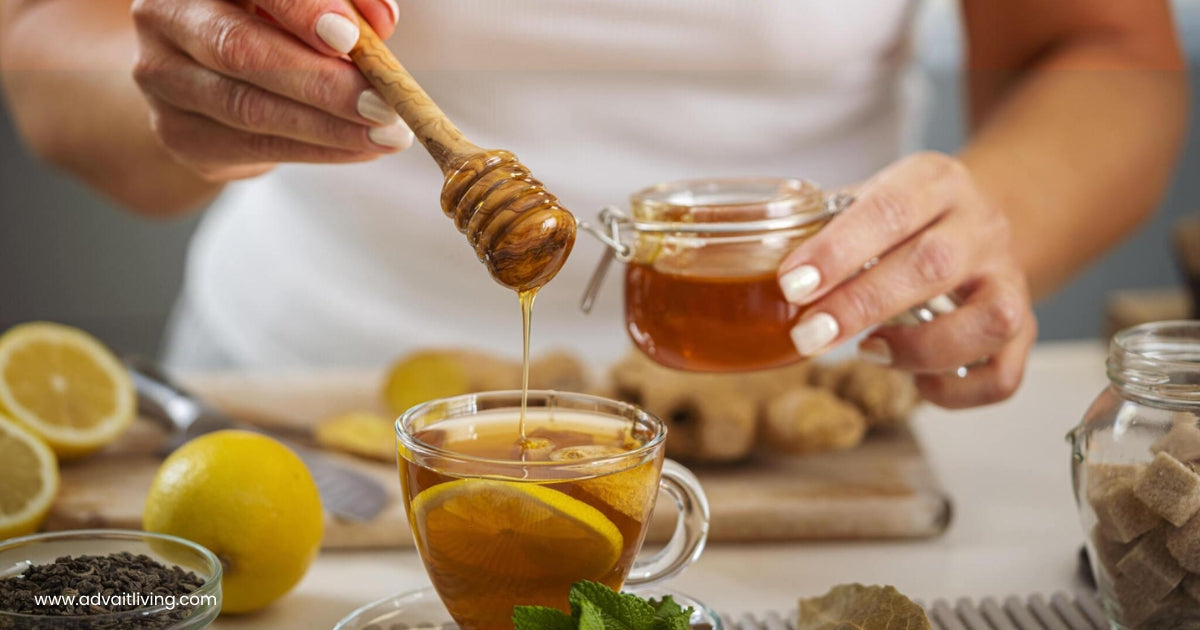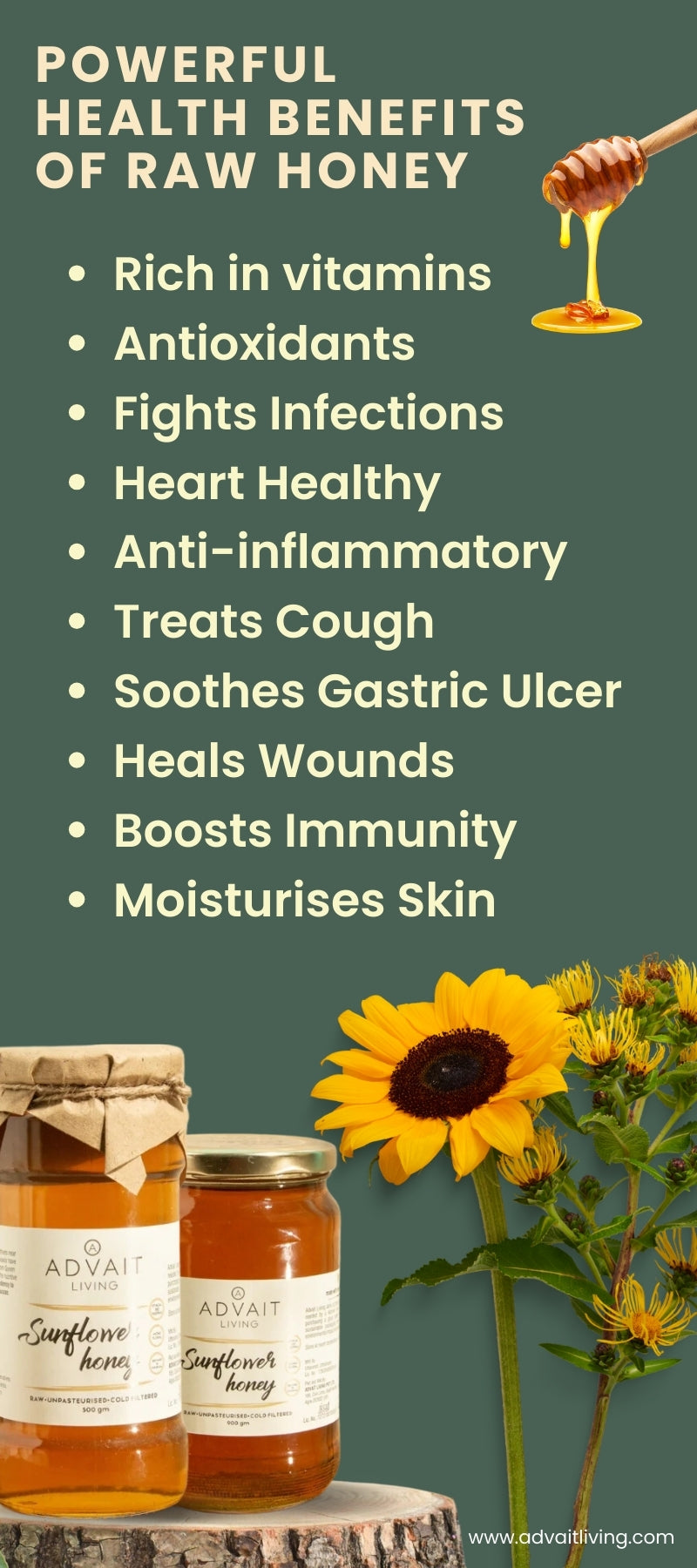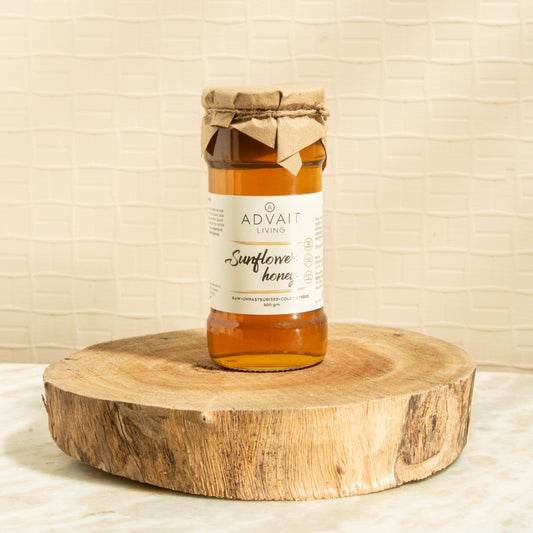Raw honey is an unfiltered, concentrated flower nectar from the beehives. It does not undergo any treatment to alter its natural characteristics. This type of honey is rich in taste and aroma and has diverse flavours. Beyond the impeccable taste and aroma, raw honey is known for its promising health benefits. From antioxidant properties to minimising the risk of cardiovascular disease, raw honey is highly preferred for improving health conditions.
Health Benefits of Raw Honey
Raw honey is enriched with various nutrients like carbohydrates, amino acids, minerals, vitamins, phytochemicals and many more. These compounds are proven to improve health conditions by fighting off free radicals, removing bacteria, healing wounds and inflammation, and improving eye disorders, brain health, and diabetes.
Here are some of the potential health benefits of raw honey that are scientifically proven.
1. Nutritional Content of Raw Honey
Raw honey contains several nutritional compounds, and this composition varies from one type of honey to another. This variation in nutritional content is based on the type of plants on which the bees feed. It is also evident that 100 g of honey produces nearly 320 kcal. Honey contains about 200 compounds, and the main constituents are fructose and glucose.
Other than fructose and glucose, raw honey has amino acids, vitamins, minerals and enzymes. Despite the variation in the nutritional content, all raw honey contains flavonoids, phenolic acids, ascorbic acid (vitamin C), tocopherol (vitamin E), and other enzymes such as catalase (CAT), superoxide dismutase (SOD), and reduced glutathione (GSH). These enzymes are necessary to fight off harmful free radicals in the body.
The pollen provides vitamin B complex to the raw honey. However, during the processing of the honey, the removal of pollen content eliminates vitamin B, along with vitamin C, in the raw honey. This proves that raw honey is rich in nutrients compared to commercially processed honey.
2. Antioxidant Property
Rich in antioxidant properties, raw honey is better known for protecting against the harmful effects of free radicals and reactive oxygen species (ROS). These free radicals and reactive oxygen species are capable of inducing cancer, autoimmune disorders, neurodegenerative diseases, ageing, and more. This antioxidant property in raw honey is mainly due to the presence of phenolic compounds.
The antioxidant property of raw honey varies with the colour and total phenolic content. Compared to light-coloured honey, dark-coloured honey, like honeydew honey, has high phenolic content exhibiting more antioxidant properties.
The presence of pollen in the raw honey contributes to the phenolic content. However, in processed honey, these pollens are filtered, resulting in a lesser amount of phenolic compounds. This implies that raw honey has a better antioxidant effect than processed honey.
3. Protects Against Microbes
Several studies confirm the antimicrobial properties of raw honey against bacteria, fungi, and viruses. Bees produce an enzyme called glucose oxidase that converts glucose into gluconic acid. This process makes the honey more acidic and prevents any microbial growth and survival.
Hydrogen peroxide contributes the most to the antimicrobial properties and is synthesised by the bees. Besides this, non-peroxide factors are also responsible for the antimicrobial property. As different honey has different concentrations of these compounds, the antimicrobial effect of the raw honey varies.
To be precise, these differences mainly depend on the geographical distribution, seasonal and botanical sources, harvesting, processing, and storage conditions of the raw honey.
It is also important to note that the higher the concentration of honey, the more the impact of the antimicrobial property.
4. Prevents Inflammation
The anti-inflammatory properties of raw honey are primarily due to its antiseptic nature. Honey helps remove bacteria that cause inflammation and reduces the amount of microbes present in the wound. This, in turn, reduces the inflammation and heals the wound. A study conducted in 2014 witnessed a decrease in oedema and inhibition in the production of ROS following the application of honey extract.
5. Heals Wounds
The wound-healing property of raw honey has been demonstrated in several clinical trials and animal studies. When raw honey is applied to burn injuries, it limits the oedema, decreasing the wound healing time and reducing the scar with no harmful effects. During application, honey causes only minimal pain and heals partial thickness burns quicker than conventional dressings.
Honey also stimulates tissue regeneration and treats wounds such as burns, trauma, leprosy, diabetic ulcers, boils, scratches, leg ulcers, gastric ulcers, and surgical wounds. Clinical studies also prove that different honeys, including Manuka honey, help to treat non-healing ulcers. A study conducted in a rat model shows that the topical application of honey increases collagen.
6. Anticancer Activity
The effects of honey on cancer have been studied, and found that honey induces apoptosis (programmed cell death). Raw honey acts against cancer cells by arresting the cell cycle. Research shows that mice that received both manuka honey and chemotherapy drugs had better life expectancy than mice that only received chemotherapy drugs. Not only this, but acacia honey also exhibited anti-tumour activity in lung cancer cells.
7. Helps with Gastrointestinal Diseases
Consuming raw honey repairs the damaged intestinal mucosa and stimulates the growth of new tissues. Honey also helps to decrease the duration of diarrhoea and heals antral ulcers. When raw honey is mixed with ginger juice, it relieves indigestion.
8. Treats Cough
One of the evergreen treatments to treat cough and cold is the consumption of honey. Raw honey is better at treating coughs than dextromethorphan (cough suppressant). Some common remedies, like drinking tea or warm lemon juice with honey, or mixing honey in the raw milk, cure a cough. A recent study conducted with 90 children concluded that a honey and ginger mixture is ideal for treating cough with fewer side effects.
9. Healing Eye Disorders
Honey is widely used for treating several eye conditions like conjunctivitis, keratitis, injuries in the cornea, and chemical and thermal burns. It is also evident that applying honey to infected conjunctivitis helps to reduce redness, swelling, and pus discharge.
10. Improves Brain Health
Raw honey boosts memory power, and flavonoids in honey promote new neuron formation in the hippocampus. A clinical trial on schizophrenia patients concluded that 8 weeks of honey intake improved short-term memory.
11. Helps with Diabetes
Raw honey has a low glycemic index compared to sucrose and reduces the absorption of digested food in diabetes patients. It also reduces the lipid content in blood and blood glucose levels and increases haemoglobin concentration.
12. Reduce the Risk of Cardiovascular Diseases
Several studies report that raw honey reduces the risk of cardiovascular disorders. The flavonoid in the honey promotes the cardioprotection effect and reduces the activity of blood platelets, prevents the oxidation of bad cholesterol, and improves coronary vasodilation. The presence of phenolic compounds also prevents and protects against free radical damage.
13. Moisturise Skin
Adding raw honey to a skincare regimen protects and heals the skin with the presence of minerals, vitamins, and enzymes. Honey can also be used as a moisturiser due to its natural humectant properties. This humectant property is due to the presence of a high content of glucose and fructose in the raw honey. These compounds, along with many amino acids and organic acids, retain moisture in the skin.
14. Healthy Hair
Not only for the skin, but raw honey can be applied to hair to improve hair health. It penetrates the hair shaft deeply and improves the elasticity and flexibility of hair. Several studies suggest that shampoos and conditioners with honey help to maintain the hair in a healthy condition.
Conclusion
Packed with several nutrient compounds, raw honey offers a wide range of health benefits. It aids in wound healing, fights off harmful free radicals, prevents inflammation, and even reduces the risk of cardiovascular diseases. While processed honey has a prolonged shelf life and consistent texture, the power of raw honey always outweighs the drawbacks.
Unlike processed honey, where beneficial pollen and enzymes are stripped off, raw honey contains many health-promoting compounds. Choosing raw honey is an ideal choice when you want to prioritise natural goodness and get potential health benefits.
Frequently Asked Questions
1. Is It Healthy to Eat Raw Honey Every Day?
Yes, you can consume a spoonful of raw honey every day and gain all the health benefits of raw honey, such as reducing the risk of chronic disorders, wound healing, treating infections, aiding in digestion, etc.
2. Does Raw Honey Expire?
No, generally, raw honey doesn’t expire when stored properly. However, when honey is exposed to moisture, it spoils, produces a bad odour and forms mould. So, always make sure to keep your honey in an air-tight container to prevent it from spoiling.
3. Who Should Avoid Raw Honey?
There is no doubt that raw honey offers immense health benefits. But people allergic to pollen and infants should avoid honey. A person undergoing a certain medical condition should consult their physician before consuming raw honey.
4. Can We Eat Raw Honey Directly?
Yes. You can eat raw honey directly. Raw honey can be used as a sweetener or a topping for various dishes. It is also important to note that taking raw honey in moderation is necessary.


